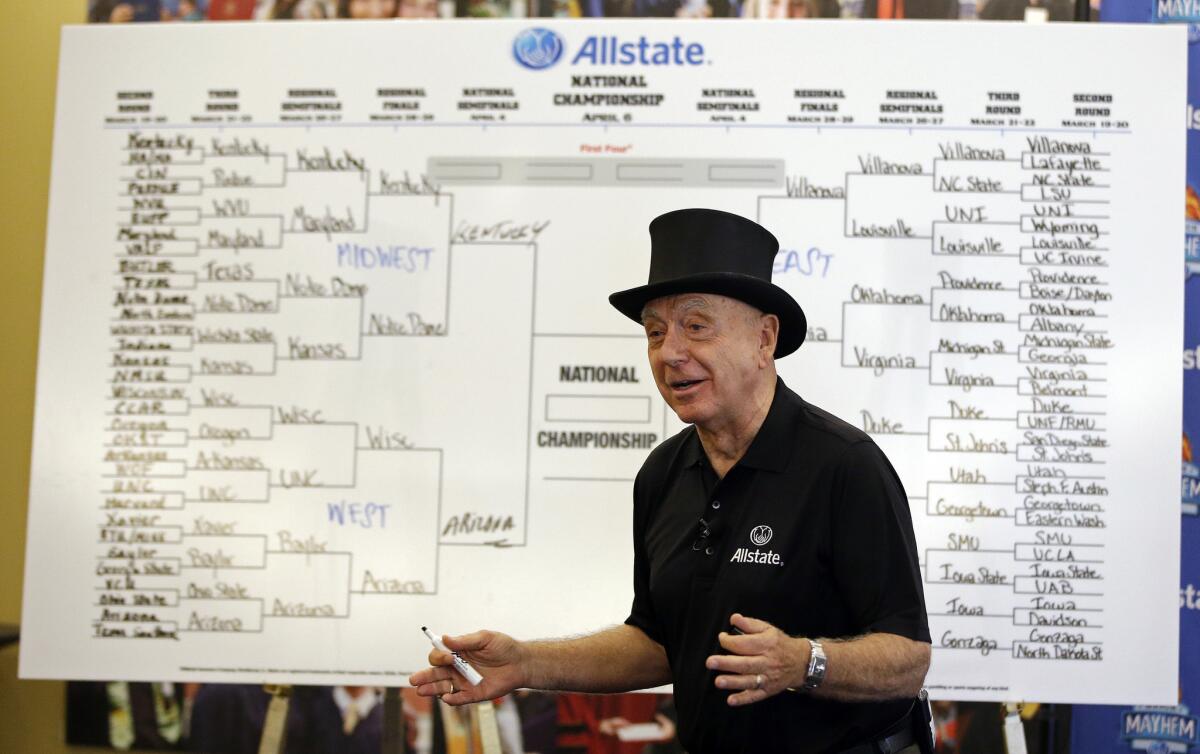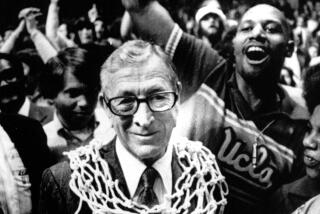NCAA brackets: Oh, what a feeling when filling them out

As American rituals go, NCAA basketball brackets are among our best — up there with fireworks and fizzy drinks on the Fourth of July. Purportedly born in a Staten Island saloon, with a scandalous twist that involved possible prison time and a deathbed plea, the brackets quickly became legal-sized launch points for March Madness itself.
What movies did for sex and romance, NCAA bracket pools did for college basketball.
I’m addicted to the feeling I get when I fill one out. Sometimes I nail it. More often, it looks like a ransom note.
But I’d skip my annual physical before I skipped an NCAA bracket.
The first bracket pools are believed to have appeared at a neighborhood joint called Jody’s Club Forest, in New York’s Staten Island. That first year, 1977, some 80 people participated, in a $10-an-entry, winner-take-all format. By 2006, Jody’s had 150,000 entries and the pot reached $1.5 million.
The IRS broke up that party after one of the winners claimed his winnings on his taxes, and the bar’s owner nearly went to prison for tax evasion. Only a deathbed request by a former Staten Island district attorney is credited with keeping Jody Haggerty out of jail.
These days, “It’s not really talked about,” one employee says of the bar’s past troubles.
Employees say the bar where it all started no longer runs a bracket, probably one of the few watering holes in the nation where some sort of NCAA pool doesn’t exist.
The launch of the bracket pools almost 40 years ago coincided with several crossroads in the game. First, the end of UCLA’s long dominance through 1975, followed by the expansion to 32 teams that made having a paper bracket more useful. When Magic Johnson and Larry Bird came along in the late ‘70s, fans were hooked.
These days, NCAA brackets — and bracket advice — can be found almost anywhere as an estimated 60 million Americans fill one out each year.
Like picking ponies based on jockey silks, you’d often be as successful picking winners based on team colors than on their quality of play (lately, blue seems to predominate). It’s almost an axiom that the office idiot will win the pot by choosing teams with their eyes closed.
Of course, No. 16 seeds never win. I mean never, though No. 11 seeds have a long history of surprises — Louisiana State in 1986 and George Mason in 2006 both made the Final Four. Last year, Dayton, an 11 seed, made it to a regional final.
For the most part, it’s still roulette. Inevitably, there will be a school no one has ever heard of. I’m convinced the NCAA invents these teams every year as an inside joke. The “pop-up schools,” I call them. Honestly, have you ever met a North Florida grad? Did you even know there was a North Florida?
No matter the outcome, take small joy that what you are doing this week might be illegal, depending on whether the organizer takes a stake in it, or solicits outsiders from other states, which can bring in the feds.
Beyond that, such pools are virtually impossible to police, assures sports law expert Marc Edelman, who notes that small private contests are of little concern to authorities.
“The moment you collect a stake in it, you’re crossing the line,” he says.
Edelman, of the Zicklin School of Business at Baruch College, City University of New York, says that most problems arise when someone claims a large windfall on tax returns, as happened in the Staten Island case, or when a disgruntled co-worker goes running to authorities.
However, the office pool might get you in hot water with the boss. In the 1990s, Lehman Brothers famously sent a company memo declaring involvement with the office NCAA pool a fireable offense. How imperious — and prescient — was that message on the evils of gambling?
Less obtrusive, of course, are the various online pools. Of the biggies, Yahoo probably has the most fetching, offering a $50,000 prize to the fan with the best bracket (legal, because there is no entry fee). ESPN and CBS also offer prizes, but those are based on a random selection plucked from top finishers.
In the end, there is still nothing better than a sharp pencil and an 11-by-17-inch paper bracket that some guy named Mike slipped you during lunch.
So go to work on it.... Slave and bleed over your selections as if that $5 bracket is your personal manifesto, your Magna Carta of another mad and glorious March.
Because it is.
Follow Chris Erskine on Twitter @erskinetimes
More to Read
Go beyond the scoreboard
Get the latest on L.A.'s teams in the daily Sports Report newsletter.
You may occasionally receive promotional content from the Los Angeles Times.







